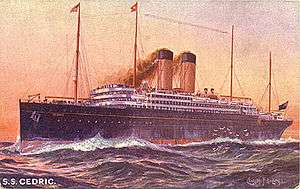RMS Cedric
 RMS Cedric | |
| History | |
|---|---|
| Name: | RMS Cedric |
| Operator: | White Star Line |
| Port of registry: |
|
| Route: | Liverpool to New York |
| Builder: | Harland and Wolff, Belfast |
| Yard number: | 337 |
| Launched: | 21 August 1902 |
| Completed: | 31 January 1903 |
| Maiden voyage: | 11 February 1903 |
| Homeport: | Liverpool |
| Fate: | Sold to Thos. W. Ward and scrapped at Inverkeithing in 1932 |
| General characteristics | |
| Tonnage: | 21,073 GT |
| Length: | 700 ft (213.4 m) o/a |
| Beam: | 73 ft (22.3 m) |
| Depth: | 44 ft (13.4 m) |
| Decks: | 5 |
| Installed power: | 14,000 ihp (10,000 kW) |
| Propulsion: |
|
| Speed: | 17 kn (20 mph; 31 km/h) |
| Capacity: | 1,223 passengers |
| Crew: | 486 officers and crew |
| Notes: | Ship colours: black hull with gold line, red boot-topping, upper works white, funnels: White Star Buff |
RMS Cedric was laid down in 1902 at the shipyard of Harland and Wolff, Belfast. RMS Cedric was the second of White Star's series known as the "Big Four", the other three being RMS Celtic, Baltic and Adriatic. Celtic was the first ship to exceed Brunel's SS Great Eastern in overall tonnage, which was quite an accomplishment, considering Brunel's giant ship held the size record for almost 40 years. Except for the Adriatic all of these in turn, when built, would be the largest ship in the world for a short time. RMS Cedric was a 21,035-gross ton ship, 700 ft (210 m) long and 75 ft 3.6 in (22.951 m) abeam, with two funnels, four masts, two propellers and a service speed of 16 kn (18 mph; 30 km/h). There was accommodation for 365 first-, 160 second- and 2352 third-class passengers. She was launched on 21 August 1902, and RMS Cedric commenced her maiden voyage from Liverpool to New York on 11 February 1903. This was the only route on which she was ever used, although Cedric was also sometimes used for winter cruises to the Mediterranean.
Trans-Atlantic service

For the next 11 years the ship plied the Atlantic crossing without any major incident. When the RMS Titanic sank in April 1912, Cedric was in New York City and the ship's departure was delayed until the RMS Carpathia arrived with survivors, including crew members not required for the court of inquiry, who wished to travel back to Liverpool. However, Cedric had to sail without any of Titanic's survivors or crew due to their mandated appearances for testimony at the U.S. inquiry. Her last voyage on the Liverpool-New York service started on 21 October 1914 after which she was requisitioned for war service, and she was then converted to an armed merchant cruiser. Cedric was decommissioned in 1916, and then she was converted into a troopship for operation initially to Egypt and then to the U.S. In April 1917, her operation came under the auspices of the Liner Requisition Scheme. On July 1st, 1917 Cedric collided with and sank the French schooner Yvonne-Odette with 24 crew drowned from the schooner. On 29 January 1918, Cedric collided with and sank the Canadian Pacific ship Montreal off Morecambe Bay. Montreal was taken in tow, but she sank the next day 14 mi (12 nmi; 23 km) from the Mersey Bar lightship. Cedric was returned to her owner in September 1919 and refitted by Harland & Wolff. She was refitted to accommodate 347 first-, 250 second- and 1000 third-class passengers. She resumed Liverpool–New York voyages. On 30 September 1923, Cedric collided with the RMS Scythia of the Cunard Line in Queenstown (Cobh) harbour during dense fog. Neither vessel was seriously damaged. On 23 October 1926, she was again altered to cabin, tourist and third class. Her last Liverpool–New York sailing commenced on 5 September 1931 and she was sold later the same year, for £22,150 to Thos W Ward and scrapped at Inverkeithing in 1932.
References
Notes
Bibliography
- Chirnside, Mark (2016). The 'Big Four' of the White Star Fleet: Celtic, Cedric, Baltic & Adriatic. Stroud, Gloucestershire: The History Press. ISBN 9780750965972.
External links
- "New White Star Line Steamship Cedric (Marine Engineering, April 1903, pp. 165–170, feature article with photographs.)
- RMS Cedric
- Collision with SV Yvonne-Odette